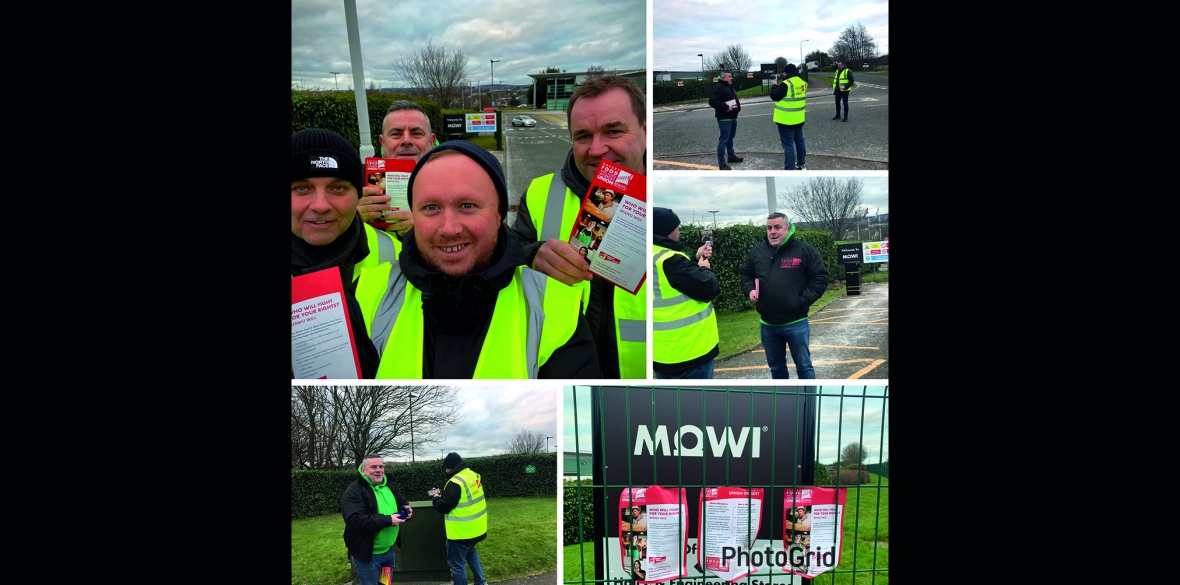This is the last article you can read this month
You can read more article this month
You can read more articles this month
Sorry your limit is up for this month
Reset on:
Please help support the Morning Star by subscribing here
MOWI are the self-proclaimed world leaders in the supply of farmed salmon. The company has a significant presence in Scotland.
It has fish farms dotted all around Scotland’s coastline as well as fish processing plants in Rosyth and Fort William. It even sponsors one of Scotland’s iconic sports, shinty.
MOWI boasts that its European operations in 2022 posted record profits of over €300 million and revenues exceeding €1 billion for the first time.
It is clear however that such profits are made around a commitment to sustainability, while in its code of conduct MOWI places a great deal of focus on its ethical credentials.
Yet, as with many other businesses, these profits are not being shared with the workers whose labour is responsible for these record revenues.
Similarly, when companies talk about ethics and their ethical conduct, they appear to be talking about everything other than the treatment of their wider workforce, and (at this stage) it certainly does not extend to working with trade unions and ensuring that workers are represented at their Scottish sites.
The Bakers, Food and Allied Workers’ Union (BFAWU) recognises that workers at MOWI need trade union representation and is actively organising the plants in Rosyth and Fort William.
For over six months the union has made a concerted effort to engage with workers at Rosyth, informing them of the benefits of workplace representation.
Working with our colleagues at Unity Consulting, we deployed old-fashioned boots-on-the-ground organising techniques. We spoke to workers at the factory gates, engaging them at the start and end of their shifts, handing out simple communications with contact details and basic messages about the importance and benefits of trade union membership.
We repeated this action on numerous occasions and supplemented our work with social and traditional media output and work with supportive local MSP Alex Rowley.
The results have been very positive. We have recruited scores of workers and it continues to grow, with a three-figure membership, which is huge progress.
Since then we have successfully represented workers in various workplace meetings, including questionable disciplinaries, and organised members’ communications and meetings.
In doing so we have increased our knowledge and awareness of workplace practices and the treatment of workers.
It is crystal clear these workers need a trade union that has their back. They have raised with us significant health and safety concerns, major issues around low pay and only recently the working week was increased from 37.5 hours to 40 hours without proper consultation with the workforce.
Given these concerns, and our belief that the union in working constructively on behalf of MOWI employees would help both the workers as well as the sustainability of the MOWI in Scotland, we have written three times to the company requesting a meeting. To date MOWI has refused to meet us.
Our aim is to secure a recognition agreement that would see us enter into constructive dialogue, with the ultimate aim of being able to effectively represent the workforce and collectively bargain on their behalf.
We will not be going away until we achieve this and will continue to recruit workers in such numbers that the company will be legally obliged to recognise the union.
However, MOWI’s failure to even meet us throws up questions for the Scottish government. The company has received millions of pounds in grants and subsidies from both the Scottish and UK governments.
We have to question why companies that do not treat their workers fairly and that refuse to recognise trade unions, let alone co-operate with them, receive such large financial support from the public purse.
This is set against the much-trumpeted Fair Work agenda that the Scottish government has developed in conjunction with the wider labour and trade union movement.
If the Scottish government wants to see Fair Work advanced, then surely it must use its levers via the public purse, either through government subsidy, grants or procurement, to set conditions to help encourage and incentivise the likes of MOWI to recognise trade unions.
Trade unions benefit workers. They make workplaces safer, increase the pay of workers and protect them against ruthless employers. The BFAWU knows this, which is why we seek to recruit food workers in some of the most insecure and low-paid workplaces.
We are committed to continuing to recruit workers at MOWI and in other workplaces. We will keep going but it is quite clear that political action is also needed.
To MOWI we say we aren’t going away, you will have to recognise us in the end. To the politicians we say start using the public pound to really make sure that Fair Work moves beyond rhetoric and is rooted in the lived day-to-day experience of every worker in Scotland.
Mark McHugh is Scottish organiser of BFAWU.












